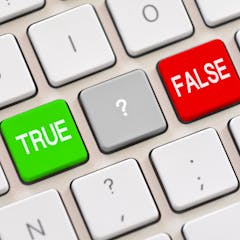
Articles on Truth
Displaying 21 - 40 of 62 articles

It turns out liars and truth-tellers behave very differently when questioned.

How much weight would you put on a scientist’s expertise versus the opinion of a random stranger? People on either end of the political spectrum decide differently what seems true.

The CDC has released conflicting messages on masks and transmission of the coronavirus. A scholar explains the nature of trust and why institutions need to be careful.

Whether in situations relating to scientific consensus, economic history or current political events, denialism has its roots in what psychologists call ‘motivated reasoning.’

Journalism’s ethics code says the press must ‘seek truth and report it,’ and also minimize harm. During a public health crisis, how should the press deal with President Trump’s inaccuracies and lies?

Is making sense of a story more important than getting at its truth? Looking at the treatment of myth in ancient Greece may help us navigate what is true, and whether that matters.

Post-truth questions the very nature of truth itself – that’s why it’s so dangerous.

Information warfare has gone global. Here are some recent campaigns, and a couple of ideas about how to fight back.

Convictions are where beliefs meet identity. But that can lead to trouble. Our supercharged politics make giving up a conviction feel like an act of self-betrayal and a betrayal of our tribe.

The programs that Americans of all political stripes like to watch seem to be united by a common theme.

We know that social media platforms have an incentive to promote whatever gets the most attention, regardless of its authenticity. We’re more reluctant to admit that the same is true of people.

More democratic forms of politics, journalism and fact-checking will be needed when we can no longer trust any video footage.

Three philosophers put up a booth at the entrance to a New York City subway, so people could come to them with questions. They got hit with some real zingers.

An evolutionary biologist makes the case that there’s no reconciling science and religion. In the search for truth, one tests hypotheses while the other relies on faith.

It would be great to know for sure when someone is lying and when someone is telling the truth. But no technology that purports to do so is foolproof.

Will we soon no longer be able to discern which videos are real and which are fake?

How medieval scientists grappled with the conflicting ‘truths’ of creationism and the eternity of the world.

Cognitive psychologists know the way our minds work means we not only don’t notice errors and misinformation we know are wrong, we also then remember them as true.

The best defence against post-truth politics is not ‘the truth’. Democracy should resist the political tyranny of claims to some immutable truth as a basis for governing the lives of others.

Perception of truth and lies changes between languages for bilingual speakers.
